
Data in Brief
Scope & Guideline
Bridging Disciplines with Essential Data Discoveries.
Introduction
Aims and Scopes
- Open Data Sharing:
Encourages the sharing of datasets to promote transparency and reproducibility in research. - Diverse Research Fields:
Covers a wide range of disciplines, including biology, environmental science, social sciences, and engineering, allowing for interdisciplinary collaboration. - Data Methodologies:
Presents methodologies for data collection, processing, and analysis, ensuring that researchers can replicate or build upon the work presented. - Promoting Data Reuse:
Aims to facilitate the reuse of data across studies, contributing to more efficient research practices and reducing redundancy. - Supporting Data Integrity:
Focuses on the quality and integrity of the datasets published, ensuring they meet certain standards for scientific rigor.
Trending and Emerging
- Environmental and Climate Data:
There is a growing focus on datasets that address environmental issues, climate change impacts, and sustainability, reflecting the urgent need for research in these areas. - Health and Medical Data:
Datasets related to health, particularly those addressing public health crises like COVID-19, mental health, and chronic diseases, are increasingly prevalent. - Machine Learning and AI Applications:
The publication of datasets intended for machine learning and AI applications is on the rise, showcasing the integration of advanced technologies in various research fields. - Social Media and Behavioral Data:
Emerging datasets that analyze social media interactions, public sentiments, and behavioral responses are trending, reflecting the digital transformation in research methodologies. - Biodiversity and Ecological Data:
Research focusing on biodiversity, ecological studies, and the impact of human activities on ecosystems is becoming more prominent in the datasets published.
Declining or Waning
- Traditional Laboratory-Based Studies:
There is a noticeable decline in datasets related to traditional lab-based experiments, as more emphasis is placed on field studies and real-world applications. - Narrowly Focused Datasets:
Datasets that pertain to very specific or niche fields are becoming less common, as the journal seeks broader applicability and relevance. - Single-Domain Focus:
Papers that focus solely on one domain without interdisciplinary aspects are appearing less frequently, as the trend shifts towards integrative and collaborative research. - Static Data Reporting:
There is a reduced emphasis on datasets that provide static or unchanging data, with a shift towards dynamic datasets that can track changes over time. - Redundant Datasets:
The journal is moving away from publishing datasets that replicate previously published data without significant new insights or methodologies.
Similar Journals
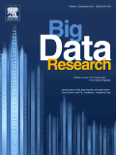
Big Data Research
Catalyzing breakthroughs in analytics and management.Big Data Research, published by Elsevier, is a leading academic journal dedicated to the exploration and advancement of Big Data methodologies and technologies. With an ISSN of 2214-5796, and a commendable impact reflected in its Scopus rankings—ranking Q2 in Computer Science Applications and Q1 in Information Systems—this journal offers a prominent platform for researchers and practitioners to share innovative findings in the realm of data science, analytics, and management. Since its inception in 2014, Big Data Research has fostered a multidisciplinary approach, addressing cutting-edge topics crucial for both academic inquiry and real-world applications. The journal's objectives include advancing the understanding of data-intensive systems, promoting essential methodologies for big data analytics, and enhancing data-driven decision-making processes across various industries. As an open access journal, Big Data Research is committed to disseminating knowledge widely, allowing researchers, professionals, and students to stay at the forefront of developments in this fast-evolving field. Its influence in the academic community is further underscored by a strong commitment to quality and relevance, making it an essential resource for anyone interested in the transformative power of big data.

Data Intelligence
Empowering Insights Through Open Access ResearchData Intelligence, published by MIT PRESS, is an influential open-access journal dedicated to advancing knowledge within the intersecting fields of Artificial Intelligence, Computer Science Applications, and Information Systems. Since its inception in 2019, it has rapidly established itself as a leading academic platform, achieving impressive rankings—including Q2 in its principal categories for 2023—demonstrating its impact and relevance in these dynamic fields. With an E-ISSN of 2641-435X, Data Intelligence aims to bridge theoretical research and practical applications, providing a venue for scholars and practitioners to disseminate innovative research and ideas. The journal's commitment to open access ensures that cutting-edge research is accessible to a broad audience, fostering collaboration and knowledge sharing among the global community of researchers, professionals, and students. Located in Cambridge, MA, Data Intelligence continues to pave the way for transformative insights in the realm of data-driven technologies through its rigorous peer-reviewed content and a wide array of interdisciplinary perspectives.
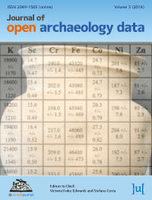
Journal of Open Archaeology Data
Connecting Communities with Open Archaeological Insights.Journal of Open Archaeology Data, published by UBIQUITY PRESS LTD, is a pioneering open access journal dedicated to the dissemination of archaeological data and research since 2012. With an ISSN of 2049-1565, this esteemed journal plays a crucial role in fostering collaboration and transparency within the archaeological community. By offering an open access model, it encourages unrestricted access to a wealth of data and findings, facilitating innovative research and education across the globe. The journal has garnered recognition in the Scopus database, achieving impressive rankings in both the Arts and Humanities and Social Sciences categories. In 2023, it ranks in the top quartile (Q2) of archaeology journals, reflecting its influence and the quality of research it publishes. Operating from the heart of London, the journal serves as a vital platform for researchers, professionals, and students alike, aiming to advance knowledge and practice in archaeology through the sharing of original research and data-driven studies.
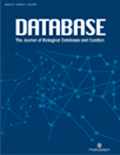
Database-The Journal of Biological Databases and Curation
Advancing the Frontiers of Biological Data ManagementDatabase - The Journal of Biological Databases and Curation, published by Oxford University Press, stands at the forefront of the rapidly evolving fields of biological data management and curation. Since its inception in 2009, this open access journal has become a pivotal resource for researchers and professionals eager to explore the intricate world of biological databases. With an impressive impact factor, it ranks in the Q1 quartile across significant disciplines such as Agricultural and Biological Sciences, Biochemistry, Genetics and Molecular Biology, Information Systems, and Medicine as of 2023. This prestigious standing reflects its commitment to high-quality research and innovation. The journal not only provides a platform for original research articles, reviews, and case studies but also aims to facilitate discussion on best practices in database design and curation. By bridging the gap between data generation and utilization, it plays an essential role in enhancing the accessibility and usability of biological data, making it indispensable for scholars and students who are navigating these complex domains.

BMC Research Notes
Unlocking Insights in Biochemistry and BeyondBMC Research Notes, published by SPRINGERNATURE, is a leading open-access journal dedicated to the dissemination of research notes across various disciplines, particularly within the fields of biochemistry, genetics, molecular biology, and medicine. Since its establishment in 2008, the journal has embraced a mission to facilitate the rapid publication of short, concise articles that contribute significantly to ongoing scientific dialogues. With an impact factor reflective of its reputation, BMC Research Notes ranks Q2 in Biochemistry, Genetics and Molecular Biology and holds a commendable Q3 classification in Medicine for 2023. Notably, the journal's Scopus rankings highlight its prominence, especially in General Medicine, where it stands in the 77th percentile. Situated in the United Kingdom, the journal prioritizes open access to foster transparency and engagement with a global audience, making it an essential resource for researchers, practitioners, and students who are looking to stay abreast of new findings and practical advancements within their fields. The journal continues to span evolving research themes from 2008 to 2024, ensuring a dynamic repository of knowledge in the rapidly advancing landscape of biomedical research.

Nature Computational Science
Bridging Theory and Practice in Computational ScienceNature Computational Science, published by Springer Nature, is a leading peer-reviewed journal that plays a pivotal role in advancing the field of computational science. With an impressive impact factor and a strong ranking in Scopus, it holds a prestigious position as Q1 in key categories, including Computer Networks and Communications, Computer Science Applications, and Computer Science (miscellaneous). This journal provides a platform for the dissemination of innovative research that drives the development of computational methods and their application across various scientific domains. Emphasizing open access to foster widespread dissemination and collaboration, Nature Computational Science aims to bridge the gap between theoretical advancements and practical implementations, making it an essential resource for researchers, professionals, and students eager to explore the latest trends and breakthroughs in computational methodologies.
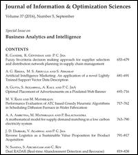
JOURNAL OF INFORMATION & OPTIMIZATION SCIENCES
Exploring the synergy between information science and optimization.JOURNAL OF INFORMATION & OPTIMIZATION SCIENCES, published by TARU PUBLICATIONS, is a vital platform for researchers and practitioners in the field of information science and optimization techniques. With a focus on the application of mathematical and computational methods to solve complex problems in various domains, this journal aims to advance knowledge and encourage innovative thinking. The journal's ISSN is 0252-2667 and the E-ISSN is 2169-0103. Although currently not Open Access, it strives to provide high-quality research that significantly contributes to the industry. With a commitment to rigor and excellence, the JOURNAL OF INFORMATION & OPTIMIZATION SCIENCES is essential for anyone dedicated to enhancing their understanding and application of optimization methodologies in an ever-evolving technological landscape.
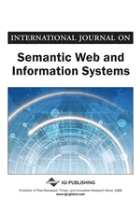
International Journal on Semantic Web and Information Systems
Exploring the Intersection of Technology and Knowledge.International Journal on Semantic Web and Information Systems, published by IGI Global, stands as a premier outlet for research in the realm of Semantic Web technologies and information systems. With a commitment to advancing knowledge and innovation, the journal is recognized for its influential contributions, evident from its prestigious Q1 rankings in both Computer Networks and Communications and Information Systems categories as of 2023. Catering to the high demands of the academic community, the journal provides a platform for interdisciplinary dialogue, showcasing cutting-edge research, methodologies, and applications that underpin the evolving landscape of information systems. Researchers and professionals can stay informed about the latest trends, best practices, and transformative technologies shaping the Semantic Web. Although it does not offer open access, the journal maintains rigorous peer-review standards to ensure quality and relevance, making it an essential resource for anyone dedicated to pushing the boundaries of knowledge in this dynamic field.

Data
Empowering research in Computer Science and Information Systems.Data is an innovative open-access journal published by MDPI, dedicated to advancing research and knowledge in the fields of Computer Science and Information Systems. Since its inception in 2016, Data has positioned itself as a prominent platform for disseminating high-quality research, currently boasting an impact factor reflective of its rigorous peer-review process and academic standards. Situated in Switzerland, the journal encompasses a broad scope of topics, making it an essential resource for researchers, professionals, and students alike. With a notable standing in multiple categories—including Q2 rankings in Information Systems and Information Systems and Management—the journal facilitates access to cutting-edge findings and methodologies that drive innovation in data management and analysis. Scholars are encouraged to utilize this open-access platform to share their findings and contribute to the collective understanding in these rapidly evolving fields.
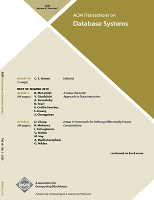
ACM TRANSACTIONS ON DATABASE SYSTEMS
Fostering Excellence in Database ResearchACM Transactions on Database Systems (ISSN: 0362-5915, E-ISSN: 1557-4644) is a premier journal published by the Association for Computing Machinery, dedicated to advancing the field of database systems. Established in 1976, this influential journal has cultivated a reputation for rigorous research, earning a prestigious Q1 ranking in Information Systems as of 2023. With its strong impact factor and notable Scopus ranking (133 out of 394 in Computer Science), it stands as a vital resource for academics, professionals, and students alike seeking to explore the intricacies of database technology, design, and applications. While the journal follows a subscription model, it remains committed to disseminating key developments and fostering knowledge in the rapidly evolving domain of information systems. With contributions from leading experts in the field, ACM Transactions on Database Systems is essential reading for anyone dedicated to the study and practice of database engineering and management.